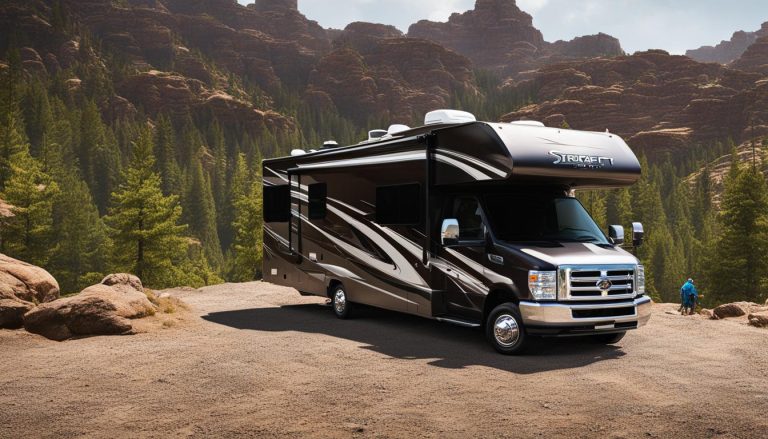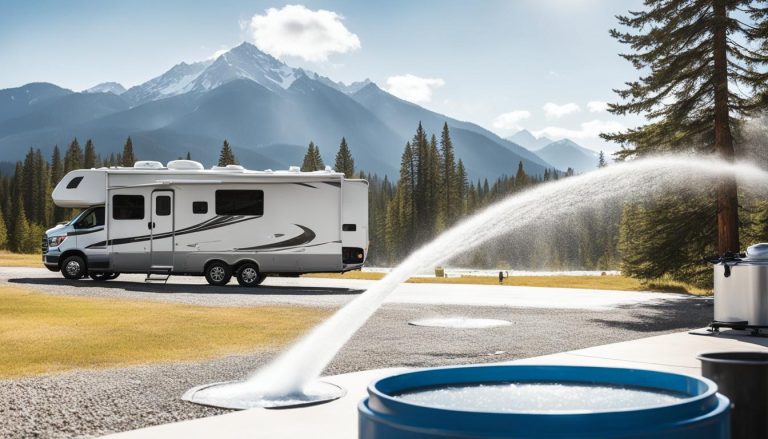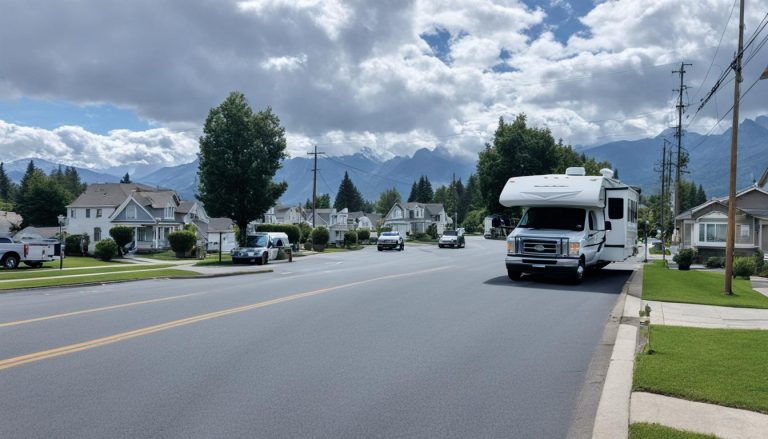Get Internet in Your RV: Stay Connected on the Go
gorvlifestyle.com and its partners may earn a commission if you purchase a product through one of our links
With the rise of remote work and digital connectivity, having internet access in your RV is no longer a luxury but a necessity. Whether you’re a full-time RVer or enjoy occasional road trips, staying connected allows you to work, stream, and stay in touch with loved ones while on the go.
There are various RV internet options available, each with its own pros and cons. In this article, we’ll explore the best internet solutions for RV living, discuss setup tips, and highlight the top service providers in the market.
Key Takeaways:
- Choose the RV internet option based on your specific needs and usage requirements.
- Consider using campground WiFi, mobile hotspots, or satellite internet depending on your location and travel plans.
- Invest in signal boosters or WiFi extenders to enhance your RV internet coverage.
- Compare data plans and coverage offered by different service providers before making a decision.
- Test the internet connection and equipment before committing to a long-term plan.
Determine Your Connectivity Needs
Before choosing an RV internet solution, it’s crucial to determine your connectivity needs. Consider how you plan to use the internet while on the road. Will you be working remotely, attending video conferences, or uploading large files? Do you need a reliable connection for streaming movies or playing online games? Understanding your RV internet usage requirements will help you select the right gear and data plan to stay connected wherever your travels take you.
When determining your RV internet needs, ask yourself the following questions:
- What is the primary purpose of your internet usage? Are you using it for leisure, work, or a combination of both?
- What specific online activities do you plan to engage in? Consider whether you’ll be streaming videos, participating in video conferences, browsing the web, or using cloud-based applications that require a stable connection.
- How many devices will be connected to the internet? Make a list of all the devices that will require an internet connection, such as laptops, smartphones, smart TVs, gaming consoles, and smart home devices.
- How frequently will you be accessing the internet? Determine whether you’ll be online for short periods or if you’ll need continuous connectivity throughout the day.
- What is your expected data usage? Calculate the approximate amount of data you’ll need based on your online activities and the number of devices connected.
By answering these questions, you can better understand your RV internet requirements and make an informed decision when choosing an internet solution. Whether you opt for campground WiFi, cellular data plans, satellite internet, or a combination of these options, knowing your connectivity needs will ensure that you have the necessary bandwidth and speed to stay connected on the go.
Using Campground WiFi and Mobile Hotspots
When you’re on the road in your RV, staying connected to the internet is essential. While some campgrounds offer WiFi access, it’s important to note that the quality and speed of the connection can vary. To ensure a reliable internet connection, even when relying on campground WiFi, you may need to consider additional options.
WiFi Extenders for RVs
One option to improve the signal strength and speed of the campground WiFi within your RV is to use a WiFi extender or booster. These devices amplify the existing WiFi signal, allowing you to enjoy a stronger and more reliable connection. By placing the extender strategically inside your RV, you can enhance the WiFi coverage and eliminate dead zones.
Mobile Hotspots for RVs
Another option is to use your phone as a mobile hotspot. This allows you to share your cellular data connection with other devices, such as laptops or tablets, providing internet access wherever you have a cellular signal. However, it’s important to note that using your phone as a hotspot may result in slower speeds and may not be suitable for heavy data usage or long-term use.
RV WiFi Extenders vs. Mobile Hotspots
When deciding between a WiFi extender and a mobile hotspot, consider your specific needs and usage requirements. WiFi extenders are ideal for improving the existing campground WiFi within your RV, while mobile hotspots provide a cellular data connection. If you plan to rely primarily on campground WiFi, a WiFi extender would be a wise investment. However, if you require a more reliable connection or anticipate camping in areas with limited WiFi coverage, a mobile hotspot may be a better option.
| Using Campground WiFi and Mobile Hotspots | Pros | Cons |
|---|---|---|
| WiFi Extenders for RVs |
|
|
| Mobile Hotspots for RVs |
|
|
Ultimately, the choice between using campground WiFi with a WiFi extender or opting for a mobile hotspot depends on your specific needs, camping style, and internet usage requirements.
Get a Reliable RV WiFi Connection
If you’re looking for a more reliable and consistent internet connection in your RV, it may be worth considering investing in a WiFi extender or a dedicated mobile hotspot device. Both options have their advantages and disadvantages, so it’s important to carefully assess your needs and choose the solution that best suits your lifestyle.
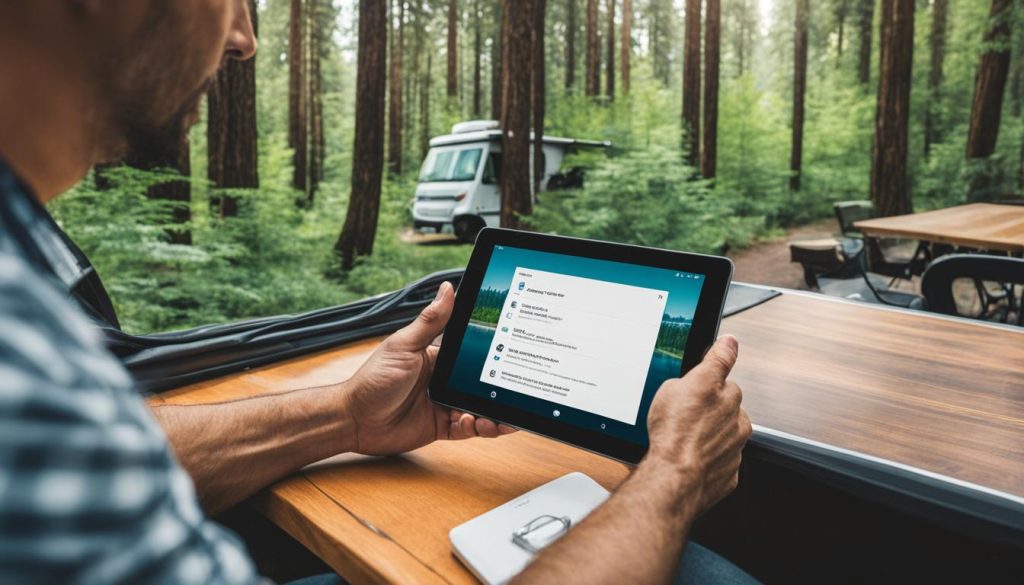
Cellular Data Plans for RV Internet
When it comes to staying connected on the go, many RVers rely on cellular data plans for their internet needs. With unlimited data options available from various cell phone providers, you can ensure a constant and reliable internet connection for your RV adventures.
Providers like AT&T, Verizon, and T-Mobile offer cell phone plans specifically designed for RV and mobile living. These plans come with hotspot capabilities, allowing you to use your phone as an internet source for your RV.
By choosing a data plan that offers unlimited data, you can surf the web, stream movies, work remotely, and enjoy all the online activities without any worries about hitting your data limit.
However, when considering a cell phone provider for RV internet, it’s crucial to take into account factors like coverage and network reliability. Look for a provider that offers extensive coverage in the areas where you plan to travel and camp.
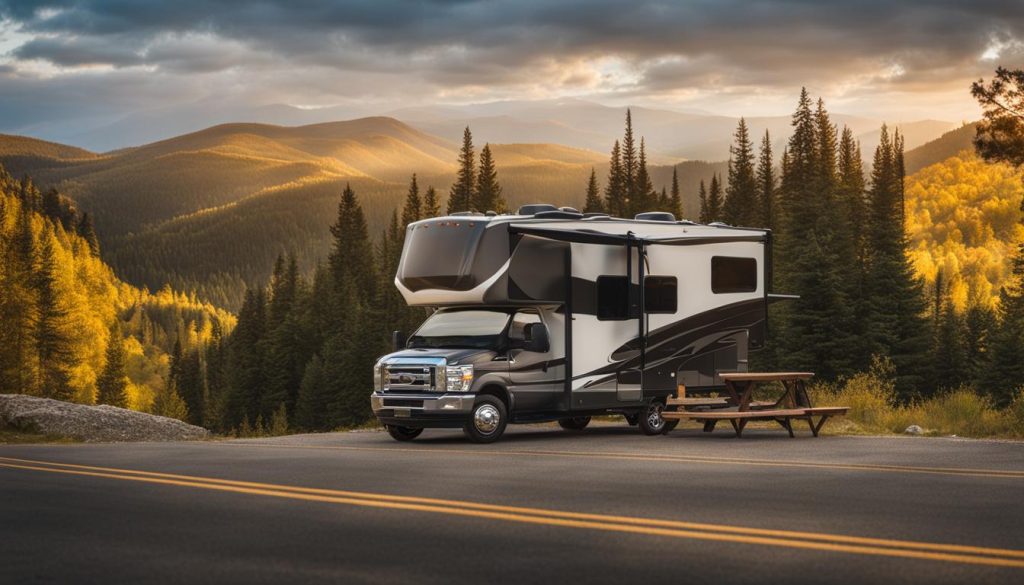
“Having an unlimited data plan for our RV allows us to stay connected wherever we go. We never have to worry about running out of data, and we can stream our favorite shows while enjoying the great outdoors.” – RV enthusiast
When comparing different cellular data plans, consider the benefits and features offered by each provider. Look into AT&T RV internet, Verizon RV internet, and T-Mobile RV internet to determine which one suits your needs and preferences best.
To make an informed decision, read reviews from other RVers about their experiences with different providers. Their insights can help you gauge the reliability and customer satisfaction level of each provider.
Comparison of Cell Phone Providers for RV Internet
| Provider | Unlimited Data | Coverage | Hotspot Capabilities |
|---|---|---|---|
| AT&T | Yes | Extensive | Yes |
| Verizon | Yes | Widespread | Yes |
| T-Mobile | Yes | Growing | Yes |
Each provider has its own strengths and weaknesses, so it’s important to choose the one that aligns with your specific needs and preferences.
By investing in a reliable cellular data plan for your RV, you can ensure uninterrupted connectivity and fully enjoy the benefits of being connected while on the road.
Satellite Internet for RVs
When it comes to staying connected in remote areas, satellite internet is a game-changer for RVers. Whether you’re exploring off-the-grid destinations or planning an extended stay in a secluded campground, RV satellite internet provides reliable access to the online world. With providers like Starlink, Viasat, and HughesNet offering satellite internet plans specifically designed for RVs, you can enjoy a seamless online experience wherever your travels take you.
Unlike traditional internet connections that rely on land-based infrastructure, satellite internet beams signals directly to your RV from orbiting satellites. This means you can stay connected even in areas where other internet options are scarce or nonexistent. Satellite internet is the ideal solution for RVers who value their independence and want to explore remote locations without sacrificing connectivity.
Benefits of RV Satellite Internet
RV satellite internet offers several key benefits for adventurers and travelers:
- Connectivity in Remote Areas: Whether you’re parked in the middle of the desert or nestled deep within a national forest, satellite internet ensures you have access to the online tools and information you need.
- Consistent Performance: Satellite internet delivers reliable performance, regardless of your location. You can stream movies, video call with family and friends, and even work remotely with confidence.
- Flexibility and Mobility: With a satellite dish installed on your RV, you can stay connected as you travel from one destination to another. As long as you have a clear view of the southern sky, your satellite internet connection will remain strong.
Considerations for RV Satellite Internet
While RV satellite internet offers incredible convenience and connectivity, there are a few important factors to consider:
- Cost: Satellite internet can be more expensive compared to other options. However, the peace of mind and reliable connectivity it provides often outweighs the higher price tag.
- Data Limits and Speed Restrictions: Depending on the provider and plan you choose, satellite internet may come with data limits or speed restrictions. It’s crucial to evaluate your internet usage needs and select a plan that aligns with your requirements.
To help you compare RV satellite internet providers, here’s a table showcasing some popular options:
| Provider | Plan Name | Data Allowance | Download Speed | Price |
|---|---|---|---|---|
| Starlink | Unlimited Basic | Unlimited | 50 Mbps | $99/month |
| Viasat | Unlimited Bronze 25 | 150 GB | 25 Mbps | $69.99/month |
| HughesNet | 20 GB | 20 GB | 25 Mbps | $69.99/month |
When selecting an RV satellite internet plan, it’s essential to consider your data requirements, location, and budget. Compare the available options and choose a provider that best suits your needs.
Signal Boosters for RV WiFi
To improve the WiFi signal in your RV and ensure a strong and reliable connection, consider using a signal booster or WiFi repeater. These devices amplify the existing WiFi signal, providing enhanced coverage and performance inside your RV. One popular choice among RVers is Weboost, a trusted brand known for its effective signal boosters.
A WiFi signal booster can be used to enhance both campground WiFi and cellular data signals, allowing you to stay connected wherever you go. With improved signal strength, you’ll experience faster internet speeds and better overall connectivity in your RV.
| Benefits of Signal Boosters for RV WiFi | Weboost |
|---|---|
| Enhanced WiFi Range | ✔ |
| Improved Signal Strength | ✔ |
| Reliable Connectivity | ✔ |
| Easy Installation | ✔ |
“With a signal booster like Weboost, you can significantly improve your RV’s WiFi signal, allowing you to enjoy better internet connectivity no matter where you are parked.”
Whether you are accessing campground WiFi or relying on cellular data, a signal booster can help ensure a seamless online experience during your RV adventures. By investing in a WiFi booster for your RV, you can enjoy improved internet speeds and reliability, making it easier to stream movies, work remotely, or stay connected with friends and family.
Using Your Phone’s Hotspot vs. a Mobile Hotspot Router
When it comes to getting internet access in your RV, you have two main options: using your phone’s hotspot or investing in a dedicated mobile hotspot router. Both options have their advantages and considerations to keep in mind.
Using Your Phone’s Hotspot
If you already have an unlimited data plan on your phone, using it as a hotspot can be a convenient and cost-effective solution for RV internet. By tethering your phone, you can share its cellular data connection with other devices, allowing you to stay connected while on the go.
However, it’s important to note that using your phone as a hotspot may not provide the same level of coverage and consistency as a dedicated mobile hotspot router. The signal strength and range of your phone’s hotspot can be limited, especially in remote areas with weak cellular reception. Additionally, if you rely heavily on your phone for other tasks, such as calls or navigation, using it as a hotspot may impact those functionalities.
A Mobile Hotspot Router
A mobile hotspot router, specifically designed for providing internet access in RVs, offers several advantages over using your phone’s hotspot. These devices are equipped with powerful antennas and technology that can boost signal strength and provide better overall coverage.
By investing in a mobile hotspot router, you can enjoy a more reliable and consistent internet connection in your RV. These routers often have the ability to connect to multiple networks simultaneously, including cellular data, WiFi, and even satellite internet, giving you more options for staying connected. Furthermore, mobile hotspot routers typically have additional features such as Ethernet ports and extended battery life, enhancing your RV internet setup.
If you frequently travel to remote areas or rely heavily on internet access for work or entertainment, a mobile hotspot router is a worthwhile investment. It provides a more robust and reliable solution compared to relying solely on your phone’s hotspot.
| Using Your Phone’s Hotspot | A Mobile Hotspot Router |
|---|---|
| Convenient and cost-effective if already have unlimited data plan | More reliable and consistent internet connection |
| Signal strength and range may be limited | Equipped with powerful antennas for better coverage |
| Potential impact on phone’s other functionalities | Ability to connect to multiple networks simultaneously |
| Additional features like Ethernet ports and extended battery life |
Ultimately, the choice between using your phone’s hotspot and a mobile hotspot router depends on your specific needs and preferences. If you value convenience and cost-effectiveness, and have a reliable data plan on your phone, using it as a hotspot can be a suitable option. However, if you require a more robust and reliable internet connection, especially in remote areas, investing in a mobile hotspot router is recommended for optimal RV internet access.
Tips for Choosing the Best RV WiFi Solution
When it comes to choosing the best RV WiFi solution, you’ll want to consider a few important factors. First and foremost, think about coverage and network reliability. Look for providers that offer extensive coverage in the areas where you plan to travel. Reading reviews from other RVers can also give you valuable insights into the reliability and performance of different providers.
Next, consider your data requirements. If you use the internet for basic tasks like checking emails and light browsing, a lower data plan may be sufficient. However, if you frequently stream videos, work remotely, or have multiple devices connected at once, you’ll want to opt for a plan with higher data limits or even unlimited data.
Budget is another crucial factor. Compare the costs of different providers and plans to find a solution that fits within your budget. Keep in mind that while some providers may offer low-cost plans, they may have limitations or slower speeds. It’s important to find the right balance between affordability and performance.
Lastly, think about your camping style. If you frequent campgrounds with reliable WiFi connections, investing in a WiFi extender or booster can help improve the signal within your RV. On the other hand, if you enjoy boondocking or camping in remote areas, you may need to rely on cellular data or even satellite internet for a reliable connection.
By considering these factors and doing thorough research, you can choose the best RV WiFi solution that meets your specific needs and enhances your on-the-road experience.
FAQ
How can I get internet in my RV?
There are two primary options for getting internet in your RV: using cellular data from a provider or accessing a local WiFi network. The best option will depend on your usage needs and camping style.
How do I determine my RV internet needs?
Consider how you plan to use the internet in your RV. Will you be working remotely, streaming movies, or attending video conferences? Understanding your usage requirements will help you choose the right gear and data plan.
Can I rely on campground WiFi for internet access?
While some campgrounds offer WiFi access, the quality and speed can vary. You may need a WiFi extender or booster to improve the signal strength and speed within your RV. Alternatively, you can use your phone as a mobile hotspot.
Which cell phone providers offer data plans for RV internet?
Popular providers like AT&T, Verizon, and T-Mobile offer cell phone plans with hotspot capabilities, which can be used as an internet source for your RV. Consider coverage and network reliability when choosing a provider.
Is satellite internet an option for RVs?
Yes, satellite internet is an option for RVs, especially for long-term stays in remote areas. Providers like Starlink, Viasat, and HughesNet offer satellite internet plans. However, it can be more expensive and may have data limits or speed restrictions.
How can I improve the WiFi signal in my RV?
You can use a signal booster or WiFi repeater to amplify the existing WiFi signal. Devices like Weboost are popular choices among RVers as they enhance both campground WiFi and cellular data signals.
Should I use my phone’s hotspot or a dedicated mobile hotspot router?
Both options are viable. Using your phone as a hotspot is convenient and cost-effective if you have an unlimited data plan. However, a dedicated mobile hotspot router offers better signal strength and reliability for RV internet.
What should I consider when choosing the best RV WiFi solution?
Factors to consider include coverage and network reliability, data requirements, budget, and camping style. Research providers and plans, read reviews, and test connections before committing to a long-term plan. Investment in the right gear is also important.

